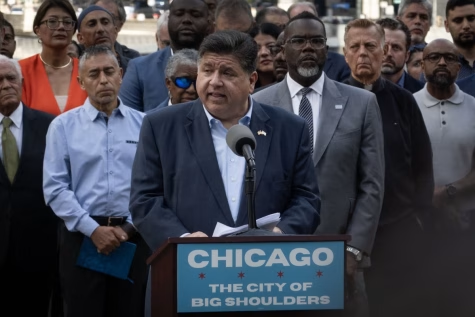Over the Labor Day weekend, Chicago experienced its most violent holiday period of the summer, with nearly 60 individuals shot and at least nine fatalities reported. Among the incidents was a drive-by shooting that injured seven people and another where a teenage girl was struck by a stray bullet. These events have intensified public outcry and renewed calls for state and federal intervention.
On Tuesday, Trump released the following statement about the situation:
 |
| FOR IMMEDIATE RELEASE 09/02/25 For J.B. Pritzker, When Will Enough Be Enough? |
| Nearly 60 people were shot and at least nine people were killed in Chicago over Labor Day weekend amid dozens of shootings that marked the most violent holiday weekend of the summer in one of the nation’s most dangerous cities. The shootings included a drive-by attack that wounded seven people and another that resulted in a teenage girl getting hit by a stray bullet.No problem, according to Democrat Gov. J.B. Pritzker — who has repeatedly resisted calls from President Donald J. Trump to ask for assistance in quelling the violence after the Trump Administration’s remarkable success cracking down on crime in the nation’s capital. According to Pritzker:“We’ve been trying to prevent crime and it’s been working.” (Link)“We have our job, which is to fight violent crime on the streets of our city — and by the way, we’re succeeding.” (Link)“There is no emergency.” (Link)“Donald Trump is attempting to manufacture a crisis.” (Link)“Big cities have crime.” (Link)Despite pleas from residents, members of the city council, and even MSNBC, Pritzker is too blinded by Trump Derangement Syndrome to take act in the best interest of his constituents and end the bloodshed. The Trump Administration’s message to Chicagoans and residents in Democrat-run cities nationwide is simple: you don’t have to live like this. |
Despite the escalating violence, Illinois Governor J.B. Pritzker has dismissed requests from President Donald J. Trump for federal assistance, labeling the situation as a manufactured crisis. Governor Pritzker stated, “We’ve been trying to prevent crime, and it’s been working,” and “There is no emergency.” He further criticized President Trump, asserting, “Donald Trump is attempting to manufacture a crisis.”
This stance has drawn criticism from various quarters, including Chicago residents, members of the city council, and even some media outlets. Many argue that the governor’s refusal to seek federal help is hindering efforts to address the city’s escalating crime problem.
In contrast, the Trump administration has emphasized the importance of federal support in combating urban violence. President Trump has highlighted the success of federal interventions in other major cities and has urged Governor Pritzker to reconsider his position for the safety and well-being of Chicagoans.
Broader national concerns further complicate the situation in Chicago. Ben Bergquam, a correspondent for Real America’s Voice, known for his coverage of border issues, has drawn connections between the city’s violence and national security concerns. Bergquam has reported extensively from the U.S.-Mexico border for his show Law and Border, highlighting the challenges posed by illegal immigration and its links to criminal activities. He argues that the influx of undocumented migrants can strain local resources and contribute to increased crime rates in urban areas.
Bergquam’s assertions add to the ongoing debate about the root causes of urban violence and the role of federal immigration policies in shaping local crime dynamics.
As Chicago grapples with its public safety crisis, the city’s leadership faces mounting pressure to adopt a more proactive approach. Advocates for federal assistance argue that collaboration between state and federal authorities is essential to effectively combat the city’s crime epidemic. The coming weeks may determine whether Governor Pritzker will reconsider his stance and seek the support needed to restore safety to Chicago’s streets.
